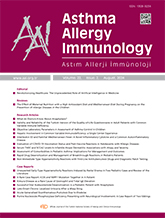


Objective: Common Variable Immunodeficiency (CVID) is the most prevalent symptomatic primary immunodeficiency in adults. This study evaluates the clinical, immune, and immunohistological characteristics of hepatic involvement in CVID.
Materials and Methods: Medical records of 72 CVID patients, including 7 with liver biopsies, were retrospectively reviewed. Immunohistochemical staining was performed to identify immune cell infiltration.
Results: We enrolled 72 patients with a median age of 38 (22–77) years, and 47% (n = 34) were female. Elevated alkaline phosphatase (ALP) levels were found in 58.3% (n=42) of the patients. Hepatic involvement was more prevalent among females, and those with hepatic involvement displayed a higher incidence of autoimmune disease. Splenomegaly was identified in 85% of the patients with hepatic involvement. Notably, switched memory B cells (IgD- CD19+ CD27+) and the CD4+/CD8+ ratio were statistically lower in patients with hepatic involvement (p=0.031, p=0.047). Liver biopsies were performed on 7 patients, revealing minimal to severe chronic hepatitis. Immunohistologic analysis of these liver biopsies revealed varying degrees of positivity of CD8+, CD4+, and CD16+. However, staining for CD21, CD56, and CD138 yielded negative results.
Conclusion: Our findings suggest that immune cells, particularly CD8+, CD4+, and CD16+ cells, may play a role in developing hepatic involvement. Understanding the underlying causes and mechanisms of hepatic involvement in CVID patients can lead to early diagnosis and targeted treatments, ultimately improving the prognosis.